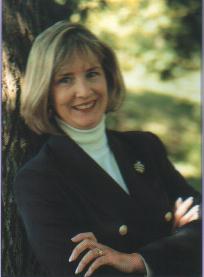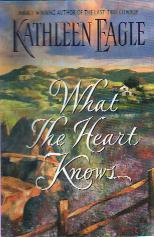
KATHLEEN EAGLE
 |








I started reading Kathleen's books about two years ago, and have been hooked ever since. Most of her books are contemporaries, and her heroes are usually Native Americans. Her characters often are working through some painful issues, and through this their integrity and strength are conveyed to the reader. Kathleen's books are passionate and powerful.

Sarah: Would you tell us a little bit about your background and your family?
Kathleen: I was an Air Force brat, born in Virginia and raised on the road. I went to high school and college in Massachusetts; I got my BA from Mount Holyoke. I have two younger siblings - my brother is a golf course superintendent in Delaware, and my sister lives in Connecticut. I've been married to Clyde Eagle for 29 years (Oct 10!) and we have three children: David - 26, Elizabeth - 22, and Christopher - 20.
Sarah: How and why did you get started writing? Were your children young when you started writing, and did this affect your writing in any way?
Kathleen: I was a high school English teacher in North Dakota. I had just gotten my MS degree and suddenly had a summer with no classes to take or teach. We lived on a ranch waaaay out in the country. The kids were still pretty young - Christopher was 3. I decided to write a story (number 2 pencil, spiral notebooks) just for fun, to please myself and no one else. That story became one of the launch books for Harlequin Historicals in 1988 - PRIVATE TREATY - but it wasn't the first one I sold. The next one I wrote was SOMEDAY SOON. I entered both books in RWA's Golden Heart competition, and both made the finals, so I attended the national conference in 1983. SOMEDAY SOON won the Golden Heart. Silhouette published it in 1984.
Sarah: Why did you select the romance genre?
Kathleen: I didn't. I wrote the first story strictly for myself. I wasn't a romance reader at the time. My husband encouraged me to try to publish it, so I queried some agents. I've only had two agents in my career - John Payne and Steven Axelrod. (John went out of the business after I'd been with him for about 6 or 7 years.) When John agreed to represent me, he explained all about "the market," that I was writing genre fiction, and that my genre was Romance. Who knew?
Sarah: How long did it take for someone to sit up and take notice? What was it like to sell your first book?
Kathleen: When I went to that first RWA conference, I met Leslie Wainger. She told me my manuscript was on her desk but she hadn't read it yet. I think I said, "I hope you like it." I was so nervous, I couldn't think. We actually had two offers on that book - one from an editor at Ballantine, who'd judged the final round of the Golden Heart and who offered more money. But Silhouette offered me a career. Leslie Wainger is my editor there to this day.
Sarah: How has your writing changed from writing for Harlequin and Silhouette to writing full length novels?
Kathleen: I think my style has changed over the years for both the longer and the shorter books. I think - I hope - I've been growing and fine-tuning the way I write a story for either publisher. Series romance is written for a specific market, and there are some expectations to keep in mind while you're writing those books. Length is one. In order to achieve a satisfying story within the length required by a given series, a writer develops a pace for that series. I don't think about length so much for the "mainstream" books. I'm looking for depth. I have a little more freedom with language, issues, and breadth of character in the longer books, and I'm able to explore more shades of gray.
Sarah: How do you approach writing? Is it a nine to five job?
Kathleen: Not exactly, although I do try to keep hours. Since fiction is the stuff that dreams are made of, I do best when I get right to work first thing in the morning, before other stuff gets into my head. If I get into the e-mail first thing - and oh, I'm tempted - it's not going to be my best writing day. I really have to discipline myself. I try to keep my day planner handy and make myself keep a log of what I accomplish each day. When I do that, I seem to accomplish more. The first part of a book goes very slowly for me because that's when I'm discovering the characters.
Sarah: Your books are often set in some beautiful areas. Where does the inspiration come from?
Kathleen: I try to write what I know, use settings where I know the terrain and the people who live there.
Sarah: Where and how do you do your research?
Kathleen:I use people shamelessly. I travel, interview, take notes, buy books, use the library. I've found a few answers to specific questions on the internet. I got a great deal of help for WHAT THE HEART KNOWS from a medical doctor through e-mail. He reads my books, so he understood how I would use the technical information I needed.
Sarah: Where do you draw your characters from? Do you draw them - especially your heroes - from real life? Is there anything of your own self in your characters?
Kathleen: I think my characters are made up of bits and pieces from lots of people I've known, pieces glued together with imagination. My husband figures into my heroes' personalities, but so do I. Sometimes I'll have a telling image in mind for a character, a moment when he's most himself, and that might be drawn from life, from something that really happened. Then I'll build on that.
Sarah: What has been your favorite book that you have written so far? Why is it your favorite?
Kathleen: That's a tough one - like asking me to choose a favorite kid. The one I just finished - THE LAST GOOD MAN (coming out next summer) - was inspired by my sister's struggle with breast cancer, so it's very close to my heart. I think I covered new ground in SUNRISE SONG, and I still get wonderful letters in response to that book. I love the hero in WHAT THE HEART KNOWS. THIS TIME FOREVER won me a RITA - have to love that. And THE NIGHT REMEMBERS was my first hard cover. I like that they brought it out in hardcover because it was new and different and interesting. I really try to do something new and interesting with each book.
Sarah: What do you do when you're not writing?
Kathleen: We have horses. I'm not a good rider, but I love to ride. I read a lot - review "Pop Fiction" for the Minneapolis Star Tribune. My garden went to weeds this past summer because I was working on a book, but I like to grow flowers, watch my bird feeders. And I love to travel. As an Air Force brat, I'm a Gypsy at heart. But I'm a nester, too.
Sarah: How have the Internet and e-mail affected your work?
Kathleen: I mentioned the help with research. I belong to a couple of writer loops. The Avon loop has been a wonderful means to get to know other authors who write for Avon. It's a particularly supportive group. We have a web page at Avon Ladies. I also keep in touch with the members of the Prairie Writers' Guild, a group of four longtime friends.
Sarah: Your books are very enlightening about the problems faced by the American Indians (especially the Sioux) today. What major understandings concerning these problems do you want your readers to gain?
Kathleen: Most of us know only Hollywood Indians. I hope people realize that the Hollywood fantasy, which slops over into a lot of popular fiction, is not the real thing. The way this country has treated the native people is a national shame, and the debt we as a nation owe has never been paid. And it's not something that our ancestors did that was wrong, too bad, over and done with, can't do anything about it now. What was done still affects people's lives today. We can still redeem ourselves somehow, I think. It starts with awareness.
Sarah: When reading your latest book, WHAT THE HEART KNOWS, I learned a bit about gaming on the reservations. This seems to be a similar trend here in my own country for the New Zealand Maori. Are there any lessons you think that should be learned from displacing the indigenous peoples in countries like the US (Native Americans), Australia (Aborigine), and New Zealand (Maori)?
Kathleen: Part of the displacement process is the attitude that our culture is superior: "We know what's best for you." This is horribly paternalistic. And then we wonder why the people we've displaced and stripped end up having so many problems. I do think women empathize better than men. We've been patronized historically, too.
Sarah: Do you think that the debts that some peoples and governments owe to these indigenous people can ever be repaid?
Kathleen: I think we need to try, for the sake of our national soul. In this country we're bemoaning our "loss of moral compass." That didn't start with the invention of television. It started with "manifest destiny."
Sarah: You said once that you worried about what Native American women felt about your books. Is this still an issue? And do you plan to have a Native American woman as your heroine at some time?
Kathleen: I have had in MEDICINE WOMAN and BAD MOON RISING. I've had wonderful response from many Native American women, so I'm feeling better about that now.
Sarah: What do you hope readers will take away from your books?
Kathleen: I hope they enjoy the time spent reading. I write to entertain, first and foremost. I write an upbeat story, so I hope they come away with a sense that life is good and love is what makes it so. I hope they're able to reflect on themselves and their relationships a little bit in light of what they've read. I hope they come away curious, looking for more. More of my books, for one thing. More about something they discovered in my story. I love hearing from readers that one of my books piqued their interest and they went looking for more information or took a trip or read another book.
Sarah: I really look forward to your books coming out - when is your next one due? Can you tell us a little about it?
Kathleen: WHAT THE HEART KNOWS is out now in hard
cover. Check out the prologue on my home page. THE LAST GOOD MAN comes out next
summer in hard cover. It's about a woman who returns to Wyoming after breast cancer
surgery has cut her modeling career short and left her in emotional turmoil. She
agrees to a marriage of convenience with a man who's loved her since they were kids.
It's a ranch story, similar in setting and tone to THE LAST TRUE COWBOY, although
K. C. Houston is a rolling stone, and Clay Keogh is a rock. You'll see the difference.
Both real cowboys, though. I love cowboys. That's why I married one.

Thanks so much for doing this interview for RBL Romantica, Kathleen - it is much appreciated!
Kathleen's Website
Index of Author Interviews.
Copyright � RBL Romantica!
All rights reserved.
Reproducing material from this site without permission is prohibited.